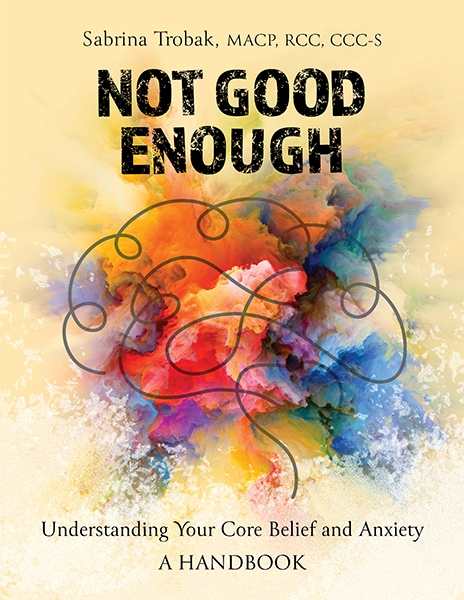Not Good Enough
Understanding Your Core Belief and Anxiety: a Handbook
The self-help book Not Good Enough promotes self-awareness as a means of breaking free from detrimental cycles.
In her engaging self-help book Not Good Enough, Sabrina Trobak suggests that awareness of one’s beliefs can lead to a healthier, fuller life.
People’s daily anxieties, Trobak says, in fact reflect their internalized beliefs, including negative mindsets that tell them they are “not good enough, not important, not valued.” (For clarity, the book names a variety of situations in which positive and negative beliefs are constructed and reinforced.) And by challenging such core beliefs, the book says, people can develop greater understandings of their past experiences, psychosomatic responses, and coping patterns.
Examples ground the text, showing the profound impacts of parenting and childhood experiences on people’s adulthood reactions. The book suggests that this is true whether one’s parents were attentive, ambivalent, narcissistic, or abusive: avoidance and the bottling up of emotions in reaction to loss, for example, are tied to later loneliness, sadness, disconnection, and fears of rejection. It also includes illustrations of positive and negative core beliefs playing out in real time, as with the example of a $100 winning: those with negative core beliefs may regard the money as useless or insufficient; those with positive core beliefs may respond to it as an opportunity for growth. Further, throughout the text, negative beliefs are depicted in dark, swirling thought bubbles, whereas clean, defined lines are used to illustrate positive beliefs. Such visual cues pair with effective anecdotes to convey associated cascades of thoughts. Infographics and diagrams further expand upon the material.
The book builds its credibility by referencing and engaging with trusted psychological theories. It ties its coverage of unstable parenting to Abraham Maslow’s hierarchy of needs, for example, using that model to better interpret real-life dynamics. But in its focus to promote personal awareness of one’s emotions and their related sensations, the book ends up rushing through other elements of its recommendations, as with its sections on healing with others, and when handling complex concepts like contradictory internal desires around negative beliefs and the scientific differences between frustration and anger. More useful are its tangible recommendations, including breathing techniques and planning strategies to develop more confidence in social situations. The book’s chapter summaries and spaces for engaged reflection further recommend it as a helpful tool.
The self-help book Not Good Enough promotes self-awareness as a means of breaking free from detrimental cycles.
Reviewed by
Aleena Ortiz
Disclosure: This article is not an endorsement, but a review. The publisher of this book provided free copies of the book and paid a small fee to have their book reviewed by a professional reviewer. Foreword Reviews and Clarion Reviews make no guarantee that the publisher will receive a positive review. Foreword Magazine, Inc. is disclosing this in accordance with the Federal Trade Commission’s 16 CFR, Part 255.

